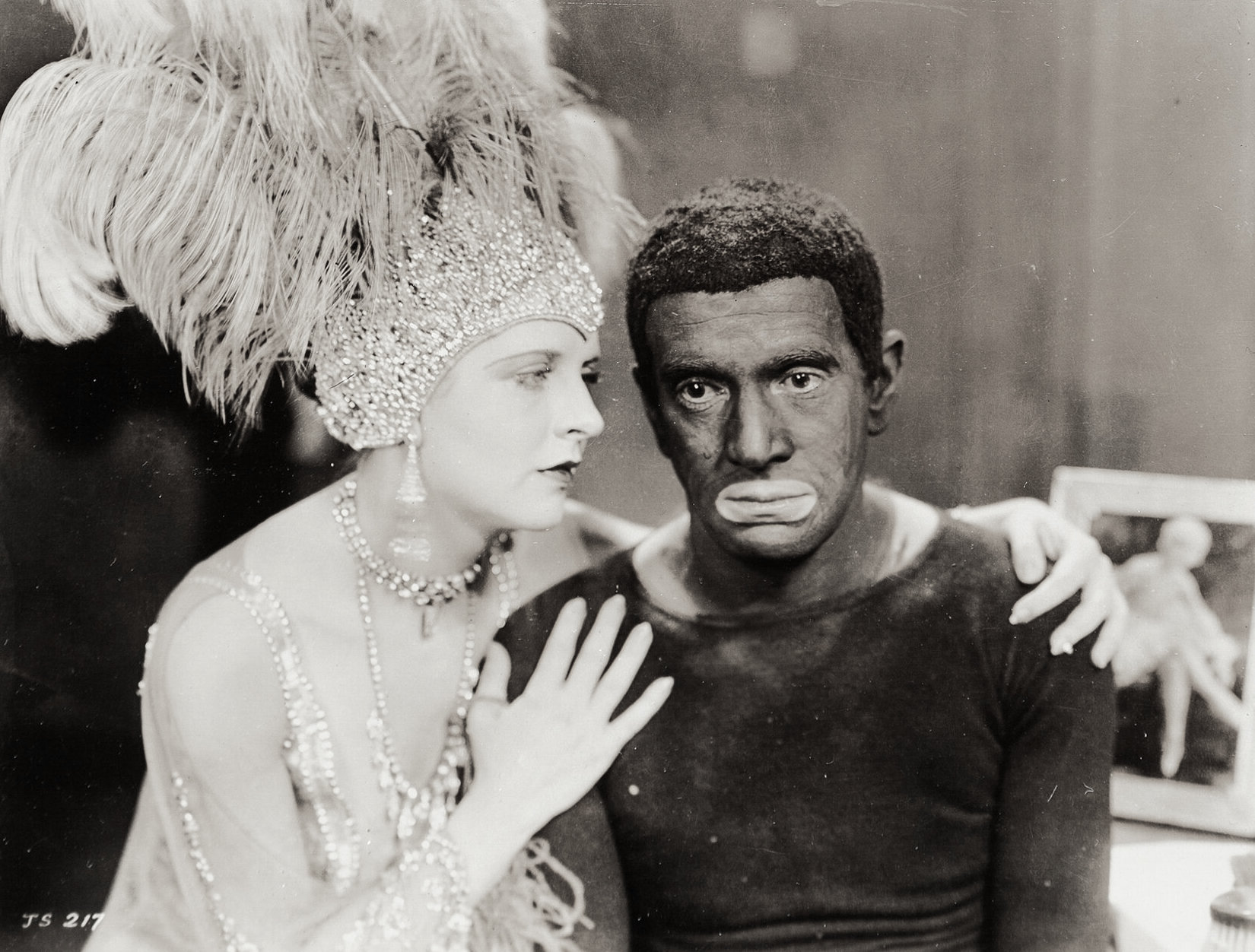The Jazz Singer is a 1927 American musical film. As the first feature-length motion picture with not only a synchronized recorded music score, but also lip-synchronous singing and speech in several isolated sequences, its release heralded the commercial ascendance of sound films and the decline of the silent film era - wikipedia ![]()
The premiere was screened on October 6, 1927, at Warner Bros.' flagship theatre in New York City. So it's the 90th anniversary Friday October 6, 2017.
VIMEO 73444754
The Jazz Singer (1927) - vimeo ![]()
Directed by Alan Crosland and produced by Warner Bros. with its Vitaphone sound-on-disc system, the film, featuring six songs performed by Al Jolson, is based on a play of the same name by Samson Raphaelson, adapted from one of his short stories, "The Day of Atonement".

Description: Warner Bros. publicity photo for the film The Jazz Singer (1927), featuring stars May McAvoy and Al Jolsons - - wikimedia ![]()
The film depicts the fictional story of Jakie Rabinowitz, a young man who defies the traditions of his devout Jewish family. After singing popular tunes in a beer garden he is punished by his father, a hazzan (cantor), prompting Jakie to run away from home.
YOUTUBE 4gu7zgWxNRc
The son of a Jewish cantor must defy his father in order to pursue his dream of becoming a jazz singer. £2.49 on youtube or Google Play ![]()
Some years later, now calling himself Jack Robin, he has become a talented jazz singer. He attempts to build a career as an entertainer but his professional ambitions ultimately come into conflict with the demands of his home and heritage.

Low-resolution image of poster for the movie The Jazz Singer (1927), featuring star Al Jolson
- wikimedia ![]()
Above is one of many alternative posters—this one designed for theaters charging 25 cents; the image of Jack, in a suggestive nightrobe, carrying Mary does appear in the film. It appears shortly after Jack sees Mary perform for the first time.
Darryl F. Zanuck won an Honorary Academy Award for producing the film; Alfred A. Cohn was nominated for Best Writing (Adaptation) at the 1st Academy Awards. In 1996, The Jazz Singer was selected for preservation in the National Film Registry of "culturally, historically or aesthetically significant" motion pictures. In 1998, the film was chosen in voting conducted by the American Film Institute as one of the best American films of all time, ranking at number ninety.
# Premiere
The premiere was set for October 6, 1927, at Warner Bros.' flagship theater in New York City; it was chosen to coincide with Yom Kippur, the Jewish holiday around which much of the movie's plot revolves. The buildup to the premiere was tense. Besides Warner Bros.' precarious financial position, the physical presentation of the film itself was remarkably complex:
Each of Jolson's musical numbers was mounted on a separate reel with a separate accompanying sound disc. Even though the film was only eighty-nine minutes long...there were fifteen reels and fifteen discs to manage, and the projectionist had to be able to thread the film and cue up the Vitaphone records very quickly. The least stumble, hesitation, or human error would result in public and financial humiliation for the company.
None of the four Warner brothers were able to attend: Sam Warner among them, the strongest advocate for Vitaphone, had died the previous day of pneumonia, and the surviving brothers had returned to California for his funeral.
# Reception
Critical reaction was generally, though far from universally, positive. ''New York Times'' critic Mordaunt Hall, reviewing the film's premiere, declared that
not since the first presentation of Vitaphone features, more than a year ago [i.e., ''Don Juan''], has anything like the ovation been heard in a motion-picture theatre.... The Vitaphoned songs and some dialogue have been introduced most adroitly. This in itself is an ambitious move, for in the expression of song the Vitaphone vitalizes the production enormously. The dialogue is not so effective, for it does not always catch the nuances of speech or inflections of the voice so that one is not aware of the mechanical features.
# Remake
The Jazz Singer is a 1980 American drama film and a remake of the 1927 classic The Jazz Singer, released by EMI Films. It starred Neil Diamond, Laurence Olivier and Lucie Arnaz and was co-directed by Richard Fleischer and Sidney J. Furie. Although the film was a critical flop, the soundtrack was enormously successful, eventually reaching multi-platinum status and becoming Diamond's most successful album to date. It resulted in three hit songs, "America", "Love on the Rocks" and "Hello Again" - allaboutmovies.com.au ![]()
# See also * Plot * Cast * Songs * Production * Premiere and reception * Commercial impact and industrial influence * Critical analysis * Legacy * Awards and nominations * See also * References * External links